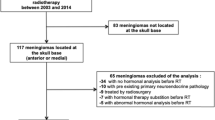Abstract
Purpose
This study aimed to evaluate the prevalence of glucocorticoid-induced adrenal insufficiency in a cohort of patients with brain and skull base tumours and to identify factors which may predict its occurrence.
Methods
Patients with brain or skull base tumours attending for a short synacthen test (SST) (adrenocorticotropin hormone (ACTH) stimulation test) at a single institution over a 3-year period were retrospectively identified. Baseline demographics and dexamethasone exposure were examined. Only patients with dexamethasone exposure were included in the final analysis looking at the primary end point of SST failure. Fisher’s exact test, Student’s t test, Mann-Whitney test and the Kendall’s tau-b test were used to evaluate the influence of age, gender, diagnosis and mean pituitary radiation dose on the primary endpoint. Receiver operating characteristic (ROC) curves were generated to explore the impact of duration and total exposure to dexamethasone on likelihood of SST failure.
Results
Thirty-one of 51 patients with previous dexamethasone exposure failed their first SST (61%). No significant relationship was demonstrated between age, gender, diagnosis or mean pituitary radiation dose and SST failure. Duration of and total exposure to dexamethasone were significantly associated with SST failure (p = 0.001 and p = 0.007, respectively). ROC curves generated values of 78 days and 171 mg days to give a sensitivity of 94 and 97%, respectively, to detect SST failure.
Conclusions
Duration of dexamethasone use and total exposure predict for adrenal insufficiency in patients with brain and skull base tumours. Values derived from this study may be useful to identify patients at higher risk of adrenal suppression who require empirical hydrocortisone pending formal testing of the hypothalamic-pituitary-adrenal axis.



Similar content being viewed by others
References
Liu D, Ahmet A, Ward L et al (2013) A practical guide to the monitoring and management of the complications of systemic corticosteroid therapy. Allergy Asthma Clin Immunol 15:9(1):30
Gorlia T, Stupp R, Brandes AA, Rampling RR, Fumoleau P, Dittrich C, Campone MM, Twelves CC, Raymond E, Hegi ME, Lacombe D, van den Bent MJ (2012) New prognostic factors and calculators for outcome prediction in patients with recurrent glioblastoma: a pooled analysis of EORTC Brain Tumour Group phase I and II clinical trials. Eur J Cancer 48(8):1176–1184
Schiff D, Lee EQ, Nayak L, Norden AD, Reardon DA, Wen PY (2015) Medical management of brain tumors and the sequelae of treatment. Neuro-Oncology 17(4):488–504
Da Silva AN, Schiff D (2007) Adrenal insufficiency secondary to glucocorticoid withdrawal in patients with brain tumor. Surg Neurol 67(5):508–510
Dinsen S, Baslund B, Klose M, Baslund B, Klose M, Rasmussen AK, Friis-Hansen L, Hilsted L, Feldt-Rasmussen U (2013) Why glucocorticoid withdrawal may sometimes be as dangerous as the treatment itself. Eur J Intern Med 24(8):714–720
Margolin L, Cope DK, Bakst-Sisser R, Greenspan J (2007) The steroid withdrawal syndrome: a review of the implications, etiology and treatments. J Pain Symptom Manag 33(2):224–228
Schlaghecke R, Kornely E, Santen RT, Ridderskamp P (1992) The effect of long-term glucocorticoid therapy on pituitary-adrenal responses to exogenous corticotropin-releasing hormone. N Engl J Med 326:226–230
Carella MJ, Srivastava LS, Gossain VV, Rovner DR (1993) Hypothalamic-pituitary-adrenal function one week after a short burst of steroid therapy. J Clin Endocrinol Metab 76(5):1188–1191
Baek JH, Soo Kyoung K, Jung Hwa J et al (2016) Recovery of adrenal function in patients with glucocorticoids induced secondary adrenal insufficiency. Endocrinol Metab 31(1):153–160
Conflict of interest
The authors declare that they have no conflict of interest.
Author information
Authors and Affiliations
Corresponding author
Rights and permissions
About this article
Cite this article
Benghiat, H., Sanghera, P., Stange, D. et al. Dexamethasone-related adrenal insufficiency in patients with brain and skull base tumours. Support Care Cancer 26, 4031–4038 (2018). https://doi.org/10.1007/s00520-018-4264-4
Received:
Accepted:
Published:
Issue Date:
DOI: https://doi.org/10.1007/s00520-018-4264-4




